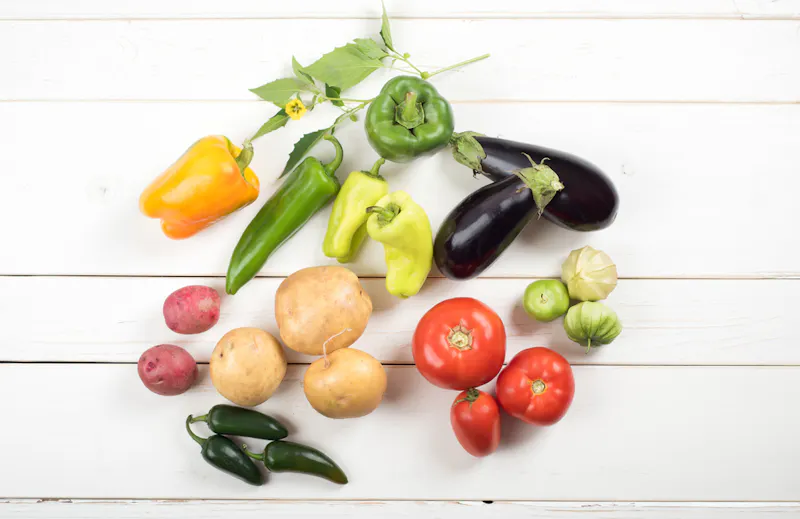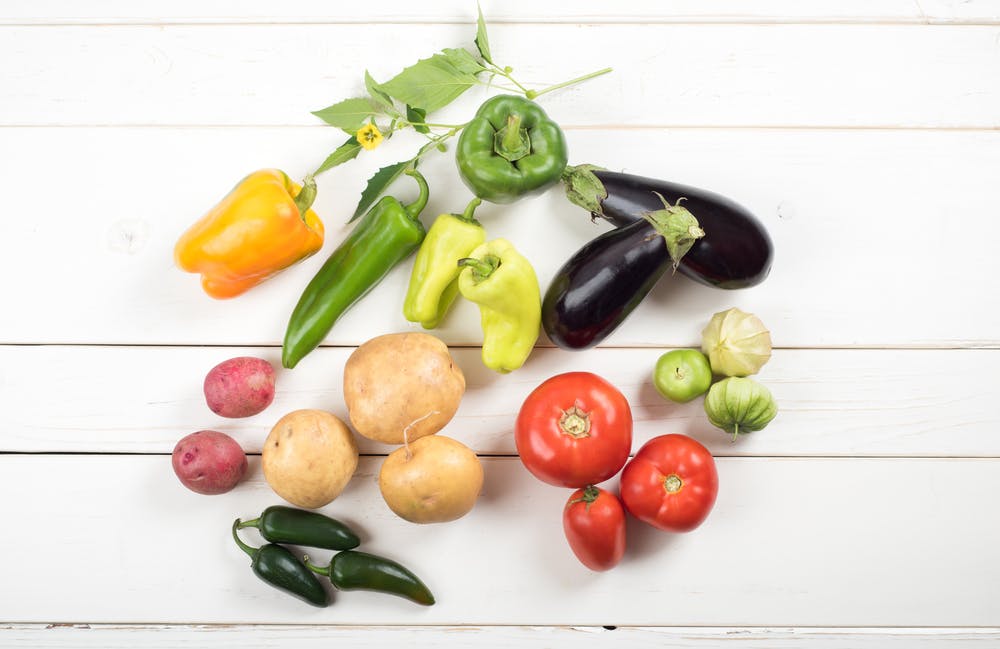Should you avoid nightshade vegetables?


Anecdotal evidence has spread a lot of fear about a family of vegetables called nightshades. With claims that they promote inflammation, many people have eliminated them from their diets. Is there any merit to restricting these from your diet? Let’s see what the research says.
What are nightshades?
Nightshades are a family of flowering plants called Solanaceae. There are almost 3000 species of nightshades, most of which aren’t edible (including the deadly herb, belladonna). But a number of nightshades are a popular part of most people’s diet — like tomatoes, aubergine, white potatoes, bell peppers, and chillies.
Nutrients in nightshades
These are nutrient-dense foods that are recommended to support health. For example, tomatoes contain powerful antioxidants like lycopene and anthocyanins, thought to help lower your risk of heart disease and cancer. While aubergines contain the antioxidant nasunin, thought to protect fatty acids essential for brain function and regulate iron levels in your body. And potatoes are an excellent source of vitamin C, a range of B vitamins, and blood pressure-regulating potassium.
So, what is it about this family of plants that cause people to eliminate them from their diet?

Are nightshades harmful?
Nightshades contain a type of alkaloid called solanine — a bitter-tasting natural insect repellent. And it’s this chemical that has earned nightshades a bad reputation. In high amounts, solanine can be toxic. But the amount of solanine in popular nightshades is so low that it shouldn’t be any cause for concern.
The low levels of solanine in popular nightshades have been claimed to trigger inflammation, causing your immune system to overreact. Which is then thought to increase your risk of developing an autoimmune disease or an inflammatory disease like Crohn’s disease. And for those with inflammatory conditions, particularly arthritis, some people believe nightshades might worsen your symptoms.
This has caused many people to eliminate nightshades from their diet, in the hopes of easing joint pain and inflammation. Some claims even go as far as saying avoiding them can cure arthritis.
Note that if white potatoes have turned green, this can indicate high levels of solanine. And there are some reports of people experiencing digestive irritation and drowsiness after eating them. So it’s safest to throw away any green potatoes.
Research into nightshade vegetables
Currently, the evidence doesn’t support the link between nightshades, inflammation, and the worsening of inflammatory conditions. As a result, bodies like Arthritis Research UK don’t support cutting these out of your diet to improve arthritis.
Benefits of nightshades
In fact, the antioxidants in these foods might help slow down the progression of arthritis. As well as protect you from other chronic diseases like heart disease. Some research even shows that other alkaloids in nightshades, like anatabine, might even help improve joint pain and stiffness.
Nightshade allergies and intolerances
It seems that some people might have an allergy or intolerance to nightshades. In terms of an allergy, this is incredibly rare. But symptoms include hives, itchiness, nausea, vomiting, inflammation, joint and muscle pain. In severe cases, it can cause anaphylaxis — a life-threatening allergic reaction.
If you think you have an allergy, it’s best to see your doctor to get an official diagnosis.
An intolerance to nightshades can happen if you have trouble digesting them properly — causing digestive issues like bloating, gas, heartburn, nausea, and diarrhoea. Research suggests that underlying issues might be responsible for intolerance to nightshades. For example, if you have a pre-existing digestive condition like Crohn's disease.
Due to the complexity of intolerances and how tricky they can be to diagnose, it’s best to speak to a dietitian about this.
Takeaways
From a scientific point of view, if you don’t experience any issues in response to nightshades, the evidence doesn’t support excluding them from your diet. These foods are full of a wide range of nutrients and antioxidants that might actually help protect you from inflammation and chronic diseases. It is, of course, always a personal choice on what foods you decide to include in your diet.
Arthritis Research UK (2011). Diet and Arthritis. Retrieved 28 August 2020 from http://www.wales.nhs.uk/sitesplus/documents/866/2010-Diet-and-arthritis%5B1%5D.pdf.
Fasano, A. (2012). Leaky gut and autoimmune diseases. Clinical reviews in allergy & immunology, 42(1), 71-78.
Lee, M. R. (2006). The Solanaceae: foods and poisons. JOURNAL-ROYAL COLLEGE OF PHYSICIANS OF EDINBURGH, 36(2), 162.
Paris, D., Beaulieu-Abdelahad, D., Abdullah, L., Bachmeier, C., Ait-Ghezala, G., Reed, J., ... & Mullan, M. (2013). Anti-inflammatory activity of anatabine via inhibition of STAT3 phosphorylation. European journal of pharmacology, 698(1-3), 145-153.
Patel, B., Schutte, R., Sporns, P., Doyle, J., Jewel, L., & Fedorak, R. N. (2002). Potato glycoalkaloids adversely affect intestinal permeability and aggravate inflammatory bowel disease. Inflammatory bowel diseases, 8(5), 340-346.
Zacharisen, M. C., Elms, N. P., & Kurup, V. P. (2002, March). Severe tomato allergy (Lycopersicon esculentum). In Allergy and asthma proceedings (Vol. 23, No. 2, p. 149). OceanSide Publications.